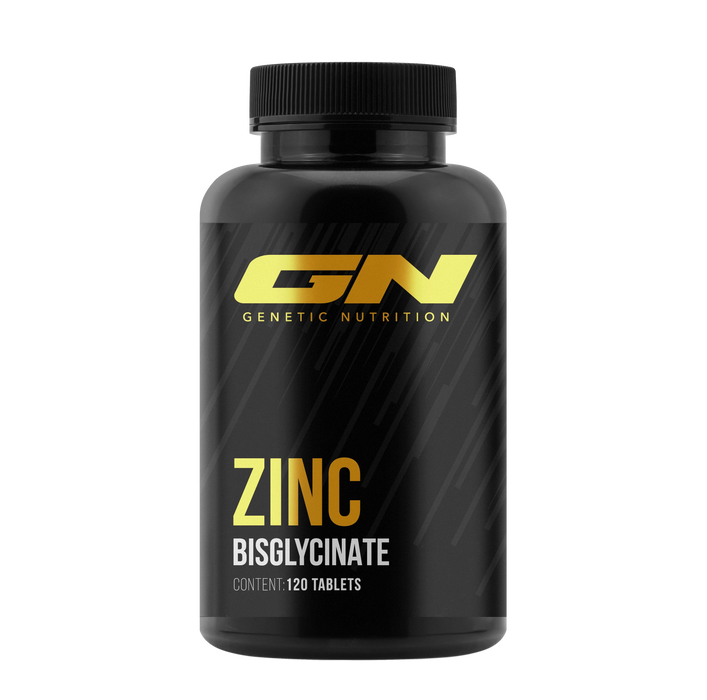
Zinc Bisglycinate · 120 Tabletten
Zink ist ein essenzielles Spurenelement, das zahlreiche Gesundheitsvorzüge besitzt und gerade für Sportler einige entscheidende Vorteile bringen kann. GN Laboratories liefert Zink in seiner bioverfügbarsten Darreichungsform, so kann eine optimale Aufnahme sichergestellt werden!
Produkt Highlights:
- Zahlreiche positive Effekte
- An einer Unmenge wichtiger Prozesse beteiligt
- Hoch dosiert
- Darreichungsform mit höchster Bioverfügbarkeit
- Leicht dosierbare Kapselform
- Höchste Qualität – hergestellt in Deutschland
Nährwerte und Inhaltsstoffe
| Zusammensetzung | pro 1/2 Tablette | % NRV |
|---|---|---|
| Zink | 25 mg | 250 % |
Zutaten: Füllstoff und Presshilfe: Mikrokristalline Cellulose, Zinkbisglycinat, Trennmittel: Siliziumdioxide.
*Prozent der empfohlenen täglichen Verzehrmenge laut Verordnung (EU) Nr. 1196/2011
**Keine Nährstoffbezugswerte (NRV) vorhanden.
Verzehrempfehlung
Täglich 1/2 Tabletten unzerkaut mit ausreichend Flüssigkeit einnehmen
Hinweise
Die angegebene empfohlene tägliche Verzehrsmenge darf nicht überschritten werden. Nahrungsergänzungsmittel sollten nicht als Ersatz für eine ausgewogene und abwechslungsreiche Ernährung verwendet werden. Das Produkt ist außerhalb der Reichweite von kleinen Kindern zu lagern.
Quellen
- Read SA, Obeid S, Ahlenstiel C, Ahlenstiel G. The Role of Zinc in Antiviral Immunity. Adv Nutr. 2019 Jul 1;10(4):696-710. doi: 10.1093/advances/nmz013. PMID: 31305906; PMCID: PMC6628855.
- Institute of Medicine (US) Panel on MicronutrientsDietary Reference Intakes for Vitamin A, Vitamin K, Arsenic, Boron, Chromium, Copper, Iodine, Iron, Manganese, Molybdenum, Nickel, Silicon, Vanadium, and Zinc.
- Shankar AH, Prasad AS. Zinc and immune function: the biological basis of altered resistance to infection. Am J Clin Nutr. 1998 Aug;68(2 Suppl):447S-463S. doi: 10.1093/ajcn/68.2.447S. PMID: 9701160.
- Kogan S, Sood A, Garnick MS. Zinc and Wound Healing: A Review of Zinc Physiology and Clinical Applications. Wounds. 2017 Apr;29(4):102-106. PMID: 28448263.
- Yamauchi K. The interaction of zinc with the multi-functional plasma thyroid hormone distributor protein, transthyretin: evolutionary and cross-species comparative aspects. Biometals. 2021 Jun;34(3):423-437. doi: 10.1007/s10534-021-00294-0. Epub 2021 Mar 9. PMID: 33686575.
- Prasad AS, Mantzoros CS, Beck FW, Hess JW, Brewer GJ. Zinc status and serum testosterone levels of healthy adults. Nutrition. 1996 May;12(5):344-8. doi: 10.1016/s0899-9007(96)80058-x. PMID: 8875519.
- Baltaci AK, Mogulkoc R, Baltaci SB. Review: The role of zinc in the endocrine system. Pak J Pharm Sci. 2019 Jan;32(1):231-239. PMID: 30772815.
- Olechnowicz J, Tinkov A, Skalny A, Suliburska J. Zinc status is associated with inflammation, oxidative stress, lipid, and glucose metabolism. J Physiol Sci. 2018 Jan;68(1):19-31. doi: 10.1007/s12576-017-0571-7. Epub 2017 Sep 30. PMID: 28965330; PMCID: PMC5754376.
- Fukasawa H, Niwa H, Ishibuchi K, Kaneko M, Iwakura T, Yasuda H, Furuya R. The Impact of Serum Zinc Levels on Abdominal Fat Mass in Hemodialysis Patients. Nutrients. 2020 Feb 28;12(3):656. doi: 10.3390/nu12030656. PMID: 32121224; PMCID: PMC7146464.
- Hernández-Camacho JD, Vicente-García C, Parsons DS, Navas-Enamorado I. Zinc at the crossroads of exercise and proteostasis. Redox Biol. 2020 Aug;35:101529. doi: 10.1016/j.redox.2020.101529. Epub 2020 Apr 1. PMID: 32273258; PMCID: PMC7284914.
- Yoon Soo Bae, Nikki D Hill, Yuval Bibi, Jacob Dreiher, Arnon D CohenInnovative uses for zinc in dermatologyDermatol Clin.(2010 Jul)
- Yosaee S, Clark CCT, Keshtkaran Z, Ashourpour M, Keshani P, Soltani S. Zinc in depression: From development to treatment: A comparative/ dose response meta-analysis of observational studies and randomized controlled trials. Gen Hosp Psychiatry. 2022 Jan-Feb;74:110-117. doi: 10.1016/j.genhosppsych.2020.08.001. Epub 2020 Aug 10. PMID: 32829928.
- Maares M, Haase H. Zinc and immunity: An essential interrelation. Arch Biochem Biophys. 2016 Dec 1;611:58-65. doi: 10.1016/j.abb.2016.03.022. Epub 2016 Mar 26. PMID: 27021581.
- Parkin J, Cohen B. An overview of the immune system. Lancet. 2001 Jun 2;357(9270):1777-89. doi: 10.1016/S0140-6736(00)04904-7. PMID: 11403834.
- Amadi CN, Offor SJ, Frazzoli C, Orisakwe OE. Natural antidotes and management of metal toxicity. Environ Sci Pollut Res Int. 2019 Jun;26(18):18032-18052. doi: 10.1007/s11356-019-05104-2. Epub 2019 May 11. PMID: 31079302.
- Jarosz M, Olbert M, Wyszogrodzka G, Młyniec K, Librowski T. Antioxidant and anti-inflammatory effects of zinc. Zinc-dependent NF-κB signaling. Inflammopharmacology. 2017 Feb;25(1):11-24. doi: 10.1007/s10787-017-0309-4. Epub 2017 Jan 12. PMID: 28083748; PMCID: PMC5306179.
- Jones DP. Radical-free biology of oxidative stress. Am J Physiol Cell Physiol. 2008 Oct;295(4):C849-68. doi: 10.1152/ajpcell.00283.2008. Epub 2008 Aug 6. PMID: 18684987; PMCID: PMC2575825.
- Sadowska-Bartosz I, Bartosz G. Effect of antioxidants supplementation on aging and longevity. Biomed Res Int. 2014;2014:404680. doi: 10.1155/2014/404680. Epub 2014 Mar 25. PMID: 24783202; PMCID: PMC3982418.
- Liguori I, Russo G, Curcio F, Bulli G, Aran L, Della-Morte D, Gargiulo G, Testa G, Cacciatore F, Bonaduce D, Abete P. Oxidative stress, aging, and diseases. Clin Interv Aging. 2018 Apr 26;13:757-772. doi: 10.2147/CIA.S158513. PMID: 29731617; PMCID: PMC5927356.
- Maret W, Sandstead HH. Zinc requirements and the risks and benefits of zinc supplementation. J Trace Elem Med Biol. 2006;20(1):3-18. doi: 10.1016/j.jtemb.2006.01.006. Epub 2006 Feb 21. PMID: 16632171.
Inhalt: 120 Tabletten Artikelnr.: 6071
